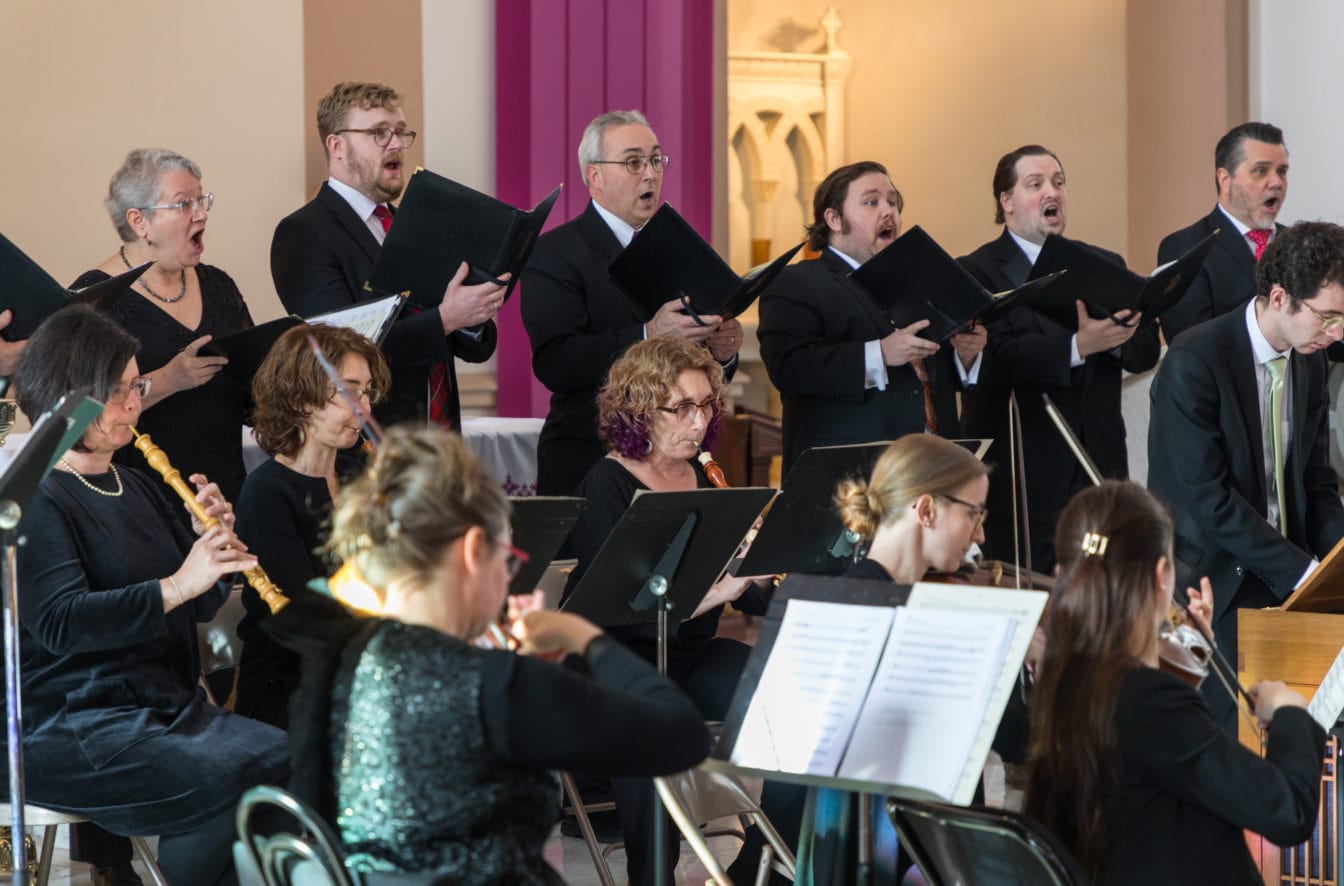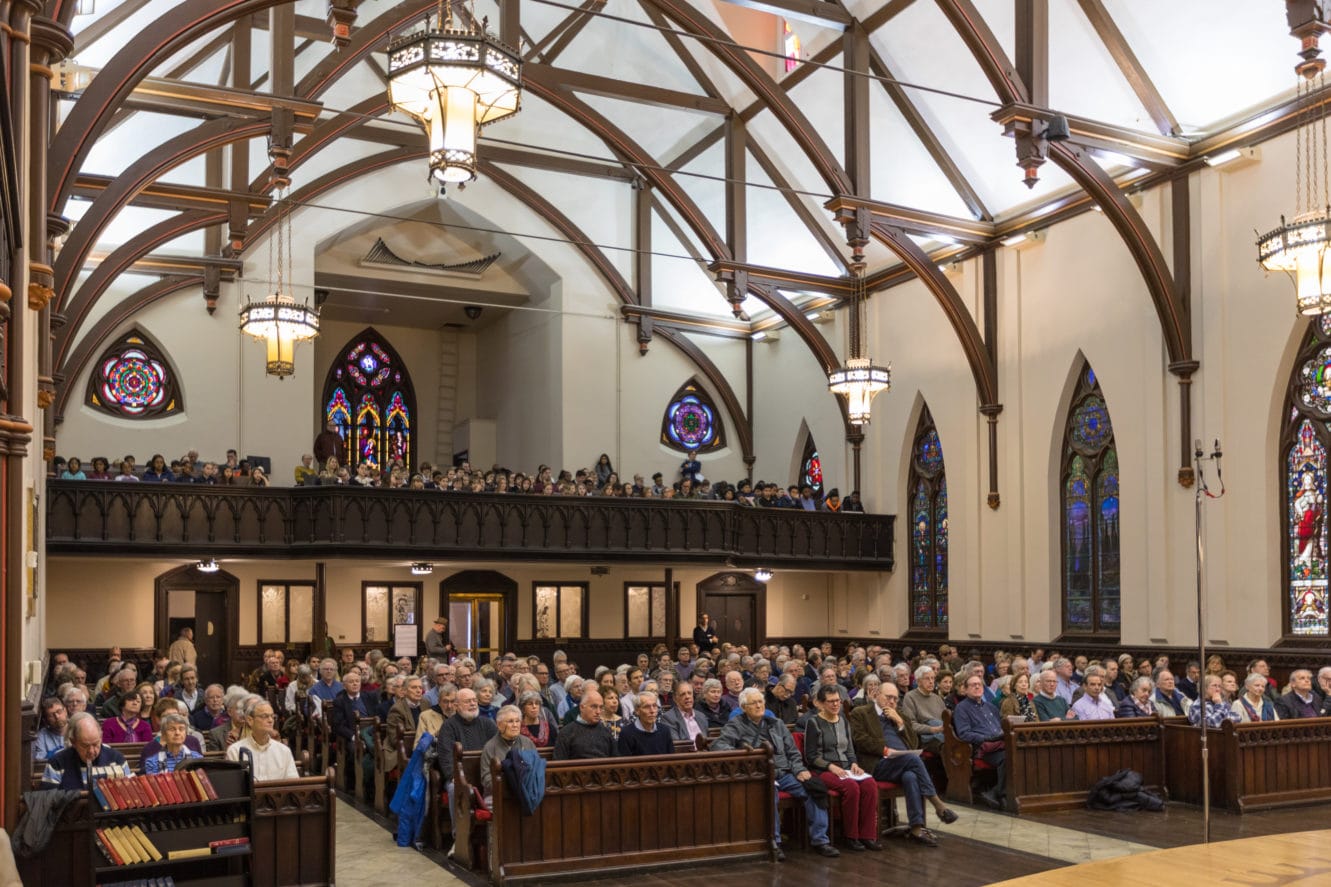For thirty years, the Washington Bach Consort has offered its Noontime Cantata Series to Washingtonians seeking a free musical escape in the middle of the workday, something District officials have declared worthy of note, pun intended.

Upon receiving the news that the DC Council has just proclaimed The Washington Bach Consort Ceremonial Recognition Resolution of 2019, citing the nimble consort’s successful musical mission to “enrich the quality of life” for District residents by ensuring the Baroque master’s music “reach[es] as many people as possible,” I went for a listen.
Under the artistic direction of Dana Marsh, a well-respected scholar, coach, and performer of early music, the Consort offers weekly performances each spring, generally from October through mid-May. In addition to its Tuesday lunchtime performances at the Church of the Epiphany (1317 G Street, NW), last year the Consort began offering the Capitol Cantatas Series, fulfilling the long-time dream of Washington Bach Consort Founder, the late Dr. J. Reilly Lewis. The vocal programming is the same for each, although the venue for the latter is St. Peter’s Church on Capitol Hill, and the downtown performances always include an organ prelude. Short, informal presentations about the works given by Marsh, accompany each performance.
If you attend one of these performances, plan to arrive early if you’re choosy about where to sit. The concerts tend to play to a full house downtown, with total annual audiences averaging about 2,200. Awareness of the concerts on Capitol Hill is still growing, a Consort spokesperson tells me, so you might get the seat you want with less planning, at least for now.
Because I relied on another beloved DC institution, the Metro, I arrived 10 minutes late to the most recent downtown concert. I missed most of organist Sonya Subbayya Sutton’s performance of Bach’s Organ Concerto in D minor (BWV 596) and had to sit in the way back. However, I was there from start to finish for the Consort’s elegant rendering in German of the cantata Ich bin vergnügt mit meinem Glücke (BWV 84), translated “I am content with my fortune.”
The German word glücke can sometimes mean “luck” or “destiny”. Daniel Melamed’s translation of the text used by the Consort goes with “fortune”. I was intrigued by this nuance, especially after hearing Marsh’s brief presentation about the work, in which he revealed the hymn that served as Bach’s inspiration for the piece was written by Countess Ämilie Juliane von Schwarzburg-Rudolstadt.

Until the concert, I had never heard of the countess. I have since done a little research and discovered she was considered one of the founders of “pietism” in the Lutheran faith, which was akin to being “born again” after the Reformation. That is not surprising to me since what struck me as I listened was the clear interplay of humility and elation in between the words and in the music. Today, “evangelism” is too often equated (and rightly so) with its tendency toward political extremism, but inherent to the born again experience is the ecstasy of being re-made into someone else, someone graced by an unseen force that stays present so long as one remains devout.
If the work were about luck, the blessings would have been random. If it had been about destiny, the bias would have been toward what was inevitable. But with “fortune”, a sense of agency is implied, leaving it up to us to choose whether we will be grateful for what we have: “What my God provides is enough for me,” goes the final chorale. “It is a confession of the soul: happy with what it has, and with what it does not have,” is how Marsh put it.
This was the first time I had heard this particular cantata performed live. Although with his typical cerebral counterpoint, Bach created a sturdy architecture upon which to hang the melody, it is an inherently feminine work, and not just because the solo is written for soprano. It’s that after years of listening to and performing sacred works, I can’t think of one that sounded to me so cheerfully happy about being lowly. There is a softness in that approach, one that is less about gender and more about the feminine energy of acceptance vs. the masculine one of resistance.
Having now listened to several different recordings of this cantata, I can say that effect was especially attributable to the direct treatment given it by soprano Katelyn G. Aungst and her fellow Consort members who, under Marsh’s direction, sounded pure and unencumbered, allowing Bach’s musical intention for the penitent to shine through.
A little Baroque goes a long way in my world. After I listen too long to Bach’s boxes of harmonies folding in and out of themselves, the aggressively mathematical sound makes me long for more whump and mess. It’s the music of Bach’s successors like the late jazz piano stylist Bill Evans who expanded and softened Bach’s geometrical approach with more Wagnerian tone-scapes that hold more fascination for me. If I am in a more structured frame of mind, I might listen to French pianist and composer Claude Bolling and friends’ 20th Century interpolations of Bach into their swinging rhythms. But, without opportunities to reflect on the genesis of jazz and Bach’s role in it, such as the ones provided compliments of the Consort, I might not appreciate what I love as much as I do, and for that I am grateful.
The Washington Bach Consort’s next Noontime Cantata Series performances will occur on May 6 & 7. Each performance is 50 minutes long. Admission is free. For more information, go online.
Locations:
Capitol Cantata Series – Monday, May 6 at 12:10 pm (and the first Monday each month through the spring)
St. Peters Church on Capitol Hill
313 2nd Street, SE, in Washington, DC
Downtown Cantata Series – Tuesday, May 7 at 12:10 pm (and the first Tuesday each month through the spring)
Church of the Epiphany
1317 G Street, NW, in Washington, DC




